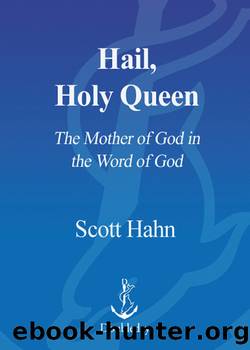Hail, Holy Queen by Scott Hahn

Author:Scott Hahn [Hahn, Scott]
Language: eng
Format: epub
ISBN: 978-0-385-51691-4
Publisher: The Crown Publishing Group
Published: 2005-10-17T16:00:00+00:00
Fetal Attraction
As we pray the Hail Mary, we echo one of the most ancient titles Christians have given to Mary: Mother of God (in Greek, Theotokos, literally âGod-bearerâ). As early as the third century (and probably earlier), the Church in Egypt prayed: âWe fly to your patronage, O holy Mother of Godâ¦â Early Fathers such as Saint Clement of Alexandria, Origen, and Saint Alexander called upon Mary as âMother of Godâ or its equivalent, âMother of the Lord.â This prayer of Christians follows Elizabethâs inspired greeting of Mary, her kinswoman: âAnd why is this granted me, that the mother of my Lord should come to me?â (Lk1:43).
With such scriptural precedent, the title âMother of Godâ went uncontested in the first centuries of the Church. Moreover, the statement follows logically from a Christianâs necessary acknowledgment of Christâs divinity. If He is God and Mary is His mother, then she is the Mother of God.
The traditional use of âMother of Godâ depended upon a theological principle called the communication of idioms. According to this principle, whatever one says about either of Christâs natures can be said truly of Christ Himself; for the two natures, divine and human, were united in Him, in one person. Thus, for example, Christians can boldly say that God the Son died on the cross at Calvary, even though God is surely immortal. Thus, too, Christians have always maintained that God was born in a manger in Bethlehem, even though God is surely eternal.
In the fifth century, however, some theologians began to raise scruples about the title âMother of God,â worrying that it implied Mary was somehow the âoriginatorâ of God. They could accept the title âMother of Christ,â they said, but not âMother of God.â They further argued against the unity of Christâs natures, saying that the Virgin gave birth to Christâs human nature but not His divine nature.
The Church disagreed, and Maryâs title was vigorously defended by Pope Celestine I, who drew strong support from Saint Cyril of Alexandria, a leading theologian of the day. Cyril pointed out that a mother does not give birth to a nature; she gives birth to a person. Mary gave birth to Jesus Christ, Who was and is a divine person. Though Mary did not originate God, she most certainly bore Him. She âmotheredâ Him.
To us, the dispute might seem abstract and academic, but its progress consumed the attention even of ordinary Christians in the fifth century, stirring them to more fervent devotion. History tells us that when Pope Celestine convoked the Council of Ephesus (A.D. 431) in order to settle the âMother of Godâ controversy, Christians thronged the city, awaiting word of the bishopsâ decision. When the bishops read the councilâs proclamation that Mary was indeed the Mother of God, the people gave way to their joy and celebrated by carrying the bishops (all two hundred of them!) aloft through the streets in a torchlit procession.
Think, for a moment, about the intensity of the affection those believers felt for
Download
This site does not store any files on its server. We only index and link to content provided by other sites. Please contact the content providers to delete copyright contents if any and email us, we'll remove relevant links or contents immediately.
Resisting Happiness by Matthew Kelly(3337)
The Social Psychology of Inequality by Unknown(3022)
Day by Elie Wiesel(2781)
Designing Your Life by Bill Burnett(2742)
The Giving Tree by Shel Silverstein(2337)
Human Design by Chetan Parkyn(2068)
Angels of God: The Bible, the Church and the Heavenly Hosts by Mike Aquilina(1966)
The Supreme Gift by Paulo Coelho(1963)
Jesus of Nazareth by Joseph Ratzinger(1811)
Hostage to the Devil by Malachi Martin(1802)
Augustine: Conversions to Confessions by Robin Lane Fox(1770)
7 Secrets of Divine Mercy by Vinny Flynn(1742)
Dark Mysteries of the Vatican by H. Paul Jeffers(1718)
The Vatican Pimpernel by Brian Fleming(1700)
St. Thomas Aquinas by G. K. Chesterton(1634)
Saints & Angels by Doreen Virtue(1604)
The Ratline by Philippe Sands(1573)
My Daily Catholic Bible, NABRE by Thigpen Edited by Dr. Paul(1500)
Called to Life by Jacques Philippe(1479)
